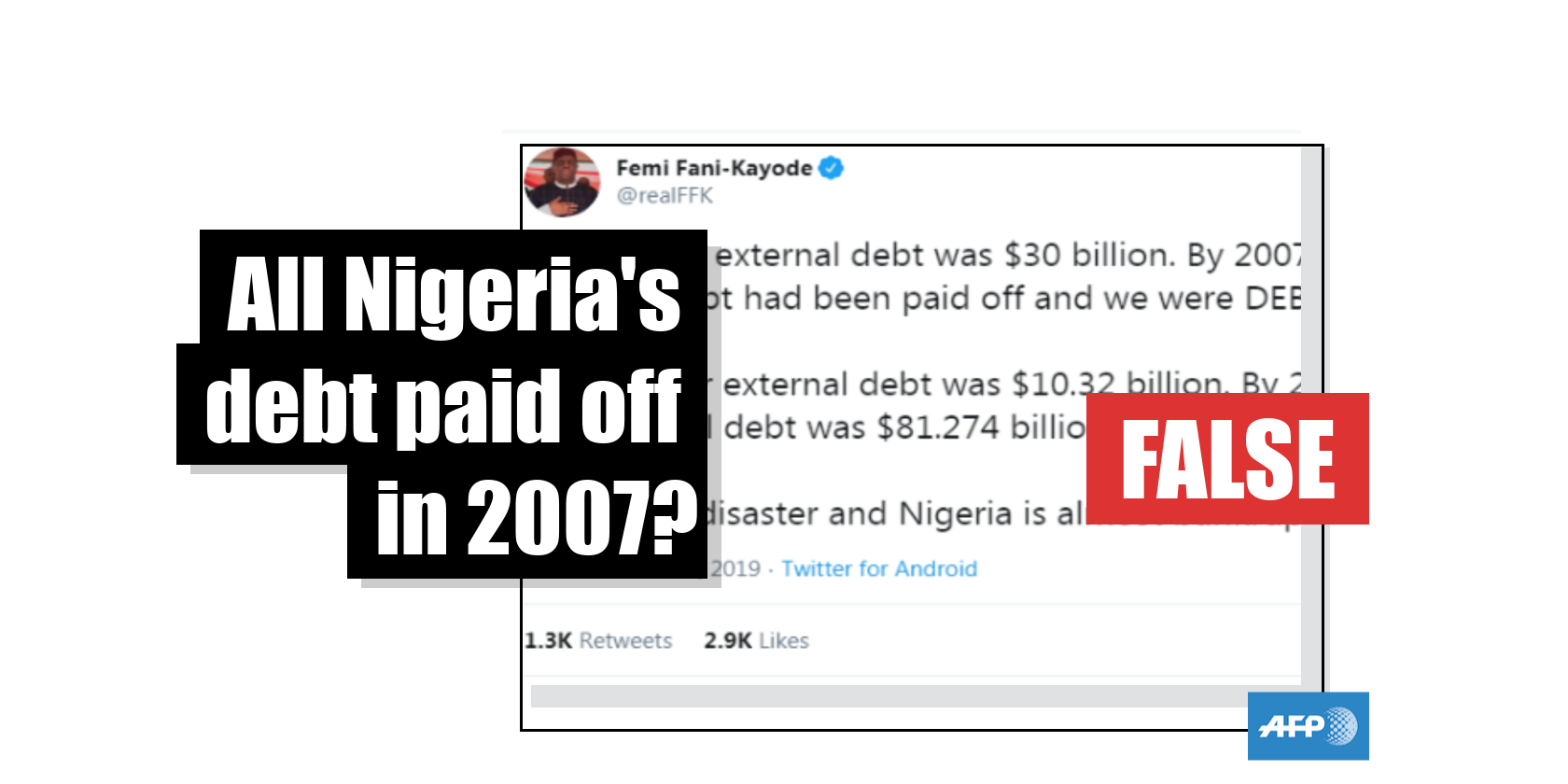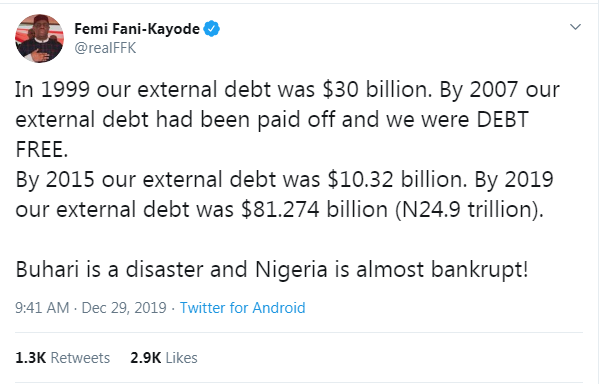
Not all of Nigeria’s external borrowings were paid off in 2007, as claimed, and neither was it totally debt free
- This article is more than six years old.
- Published on January 2, 2020 at 15:41
- Updated on January 10, 2020 at 17:30
- 4 min read
- By AFP Nigeria, Segun OLAKOYENIKAN
Former Aviation Minister Femi Fani-Kayode in a Twitter post shared hundreds of times, claimed Nigeria owed its foreign creditors $81.274 billion in 2019, despite being “debt free” in 2007 after all its external loans were “paid off”.
But Nigeria's debt records show the country still owed external lenders $3.65 billion in 2007. And, while the country’s debt has now indeed grown dramatically under Buhari, not all of it is owed abroad.
In June 2019, Nigeria’s total debt was $83.88 billion -- $27.16 billion in external funding and $56.72 billion owed domestically.

Fani-Kayode, who was handed the culture and aviation portfolios under President Olusegun Obasanjo in 2006, has been a well-known critic of Buhari’s administration since he ended 16 years of rule by the People’s Democratic Party (PDP) in 2015.
His post, which also appeared on Facebook here and here, has been shared more than 1,300 times and liked 2,800 times since it was posted on 29 December 2019.
Nigeria’s debt status is a major talking point.
Since winning a second term at elections in February 2019, Buhari’s administration has renewed plans to borrow an additional $29.96 billion which it insists is “critical to the delivery of the Government’s policies and programmes relating to power, mining, roads, agriculture, health, water and educational sectors”.
Local and international organisations have voiced concerns here, here and here about the administration’s borrowing spree that came as lower oil prices in the international market weakened the revenue of Africa’s largest oil producer.
Fani-Kayode’s claims have been echoed by several of his former government colleagues.
Former PDP presidential challenger Atiku Abubakar, who was vice president under Obasanjo, claimed in a Facebook post shared 940 times and liked more than 1,300 times that he chaired a council that “paid off Nigeria's entire debt” in 2006. We’ve archived the post here.
In November, former central bank deputy governor Obadiah Mailafia claimed in a video interview that the country was exposed to less than $7 billion of debt in 2015 and now faced a “staggering” $84 billion bill.
Obasanjo also weighed in in a speech in Lagos in late December as he slammed the current level of debt and warned of major consequences. “In four short years by March 2019, our external debt grew to N24.947 trillion or $81.274 billion. To service this current level of indebtedness, we must commit at least 50 percent of our foreign earnings. Such a situation talks about an impending bankruptcy,” the former president said.
What is it about Nigeria’s debt?
Since 2006, successive governments in Nigeria have continued to increase the country’s debt both locally and internationally to plug its large infrastructure gap, making the nation spend more than half of its revenue on debt servicing and leaving a smaller chunk for capital investment in critical sectors.
The government, however, says it is comfortable with the ratio of the country’s total public debt to its gross domestic product, which stood at 18.99 percent in June 2019. “There is yet no cause for alarm,” the government said in an end-of-the-year statement. “This is because Nigeria has a debt ceiling of 25% in the total public debt stock to Gross Domestic Product (Debt/GDP), which it has operated within.”
What’s the true picture of Nigeria’s debt?
AFP’s compilation of Nigeria’s debt records from the state’s debt agency shows that the country owed $28.04 billion to external sources in 1999; out of which 73 percent ($20.5 billion) was owed to Paris Club of creditors, a grouping of more than a dozen developed nations.
The figure rose steadily every year until the Paris Club in 2005 reached an agreement to grant relief of about $18 billion (60 percent) on the $30 billion owed. This lowered Nigeria’s external debt from $35.94 billion in 2004 to $20.48 billion in 2005.
Nigeria indeed cleared off the remaining debt owed to the Paris Club in 2006 with a final instalment of $4.5 billion. But in spite of this, the country’s external debt still stood at $3.54 billion in the year, and rose to $3.65 billion in 2007. The upward trend in the country’s external debt obligation has continued since then, hitting $10.72 billion in 2015 and $27.16 billion in June 2019 when the debt agency released the latest figures.
In addition to the external borrowing, Nigeria’s domestic debt has grown to $56.72 billion, bringing the total public debt of Africa’s most populous nation - comprising debt of the Federal Government of Nigeria (FGN), the 36 States of the Federation and the Federal Capital Territory (FCT) - to $83.88 billion in June 2019.
If we take a look at the Buhari administration’s record, we see that in June 2015 -- a month after he assumed office -- Nigeria’s total borrowing was $63.81 billion and by June 2019 it had grown to $83.88 billion. This implies the country’s debt pile increased by almost a third ($20 billion) in dollar terms under Buhari’s administration.
But in naira terms, Nigeria’s debt has grown more than double (N13.58 trillion) from N12.12 trillion in June 2015 to N25.70 trillion in June 2019 - due to the devaluation of naira which occurred within the period. A dollar exchanged for naira at N196.95 as at June 2015, but in June 2019, the rate weakened to N306.4 per dollar.
While the government agrees that the country’s debt has grown to $83.88 billion, made up of $27.163 billion in external debt and $56.72 billion owed domestically, it points to currency fluctuations for the varying accounts of Nigeria’s debt.
More so, since borrowers are expected to repay in the currency they borrowed regardless of exchange rate movement, the debt records show Buhari’s administration has increased Nigeria’s external debt by $16.84 billion (from $10.32 billion in June 2015 to $27.16 billion in June 2019); and domestic debt by N7.29 trillion (from N10.09 trillion in June 2015 to N17.38 trillion in June 2019).
Copyright © AFP 2017-2026. Any commercial use of this content requires a subscription. Click here to find out more.
Is there content that you would like AFP to fact-check? Get in touch.
Contact us
